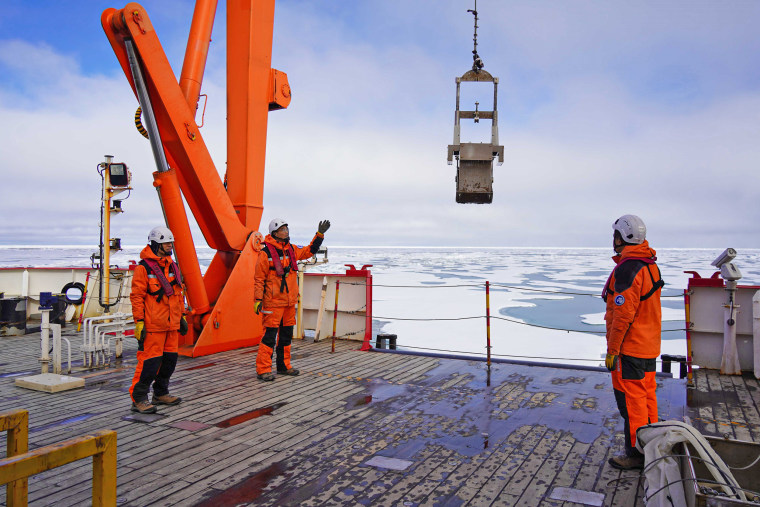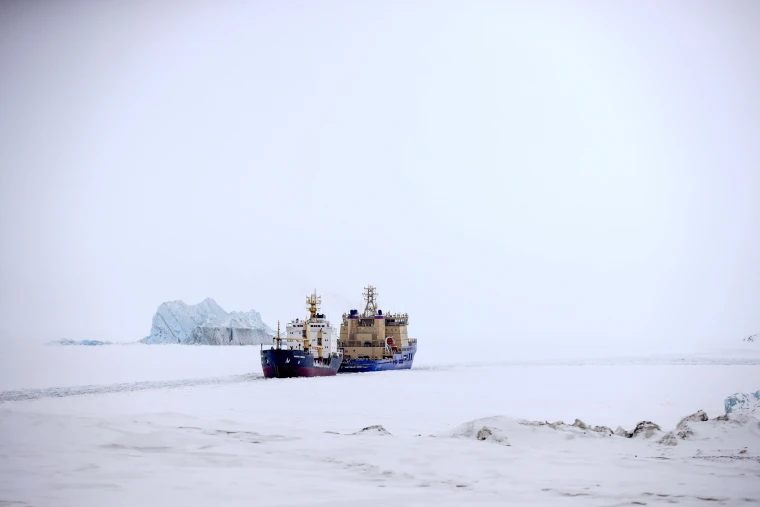Russia used to try to exclude China from the region, but increasing economic and diplomatic isolation is forcing the Kremlin to change its approach, says a new report.
Reeling under the financial and diplomatic impacts of its war in Ukraine, Russia has stepped up cooperation with China to expand its foothold in the Arctic, with significant implications for U.S. national security, according to a new private intelligence report.
Russian President Vladimir Putin has long prioritized military and economic expansion in the Arctic as a key facet of his geopolitical strategy and ambitions, and after the 2014 annexation of Crimea, he began cooperating with China in the region. But after it sought to limit the involvement of the People’s Republic, Russia recently has invited much greater Chinese participation, says the report by Strider Technologies, a firm that focuses on open-source intelligence.
“Russia’s increasing willingness to allow the PRC in the Arctic demonstrates the realness of their ‘no-limits’ partnership and its potential counterbalance to U.S.-led alliances,” the report says.
For decades, the report adds, Russia actively excluded China and other non-Arctic countries from playing a role there, including denying Chinese scientists the opportunity to conduct research and refusing to help China build icebreakers or share designs.

But Russia’s increasing economic and diplomatic isolation is forcing the Kremlin to change its approach, Strider found. The seven other countries that are members of the Arctic Council have suspended their cooperation with Russia, forcing it to seek partnerships with China that Strider says previously would have been unthinkable.
Strider’s analysis of publicly available business data found:
- From January to July 2023, 123 new companies with Chinese ownership registered to operate in the Arctic, compared with 111 registered in 2022, 77 in 2021 and 48 in 2020.
- The data also shows increasing Russia-China cooperation in several Arctic and Far East projects since 2013, especially in the areas of liquefied natural gas, mineral extraction and infrastructure.
- Russia-China trade via the Arctic Ocean’s Northern Sea Route between Europe and Asia is also on the rise. At least 11 ships transported Russian crude oil to China via the route in 2023; in 2022, only one “trial” voyage to China was made.
The Strider report also found that Russian defense spending in the Arctic has stagnated, while private commercial investment has continued to increase.
“Moscow is also shifting conventional defense spending away from the region due to the war in Ukraine and is increasingly relying on state support mechanisms to attract private investment to maintain and expand Russia’s presence in the Arctic,” the report says.
In an interview, Strider co-founder Eric Levesque said the economic realities of Russia’s current situation have forced it to grant China much more access to the Arctic than it ever previously considered.
“They are very over-reliant on China for the purchasing of their oil, their technology. And this is what we’re seeing in the Arctic,” he said.
However, he added, Russia is far ahead of the U.S. in terms of Arctic investment and development.
“The Arctic for the U.S. consistently seems to be an afterthought,” he said. “U.S. has not been prioritizing it. Russia is probably 10 years or more ahead of the U.S. We have, like, one functional icebreaker, and it was built in the ’70s.”
Members of the House Homeland Security Committee expressed similar concerns, as did expert witnesses, at a hearing in November examining the implications for U.S. national security of Russian-Chinese cooperation in the Arctic.
“We must respond to bolster our presence, both military and civilian, to make sure that we can protect our national security interests, economic security interests, energy security interests and environmental security interests that are so critical to our national security,” Sen. Dan Sullivan, R-Alaska, testified as a witness.
Though Russia continues to maintain strategic nuclear forces in the Arctic, Strider identified a significant decrease in spending by four of five major Russian state-owned defense organizations in the Arctic. Compared with the peak spending in 2019, the cumulative spending of those five organizations declined by about 90% in 2021, the report says — most likely because of the Ukraine war.
The budget for the government body responsible for socioeconomic development of the Arctic, the Ministry for the Development of the Russian Far East and Arctic, has increased almost 300% since 2016, according to Strider’s data. Private-sector company and individual entrepreneur participation in Kremlin-backed special economic zones in the region increased from about 230 entities in 2016 to more than 4,000 last year.
“These changes demonstrate the Arctic is still a priority for Russia’s geopolitical strategy and ambition,” the report says. “While Russia is adapting and balancing both a full-scale invasion of Ukraine and pursuing its Arctic ambitions, the West, NATO, and other Arctic stakeholders need to similarly adapt and balance countering Russia in both Ukraine and the Arctic. The failure to do so would result in the West falling further behind and risking Arctic security and losing economic benefits to Russia and the PRC.”



